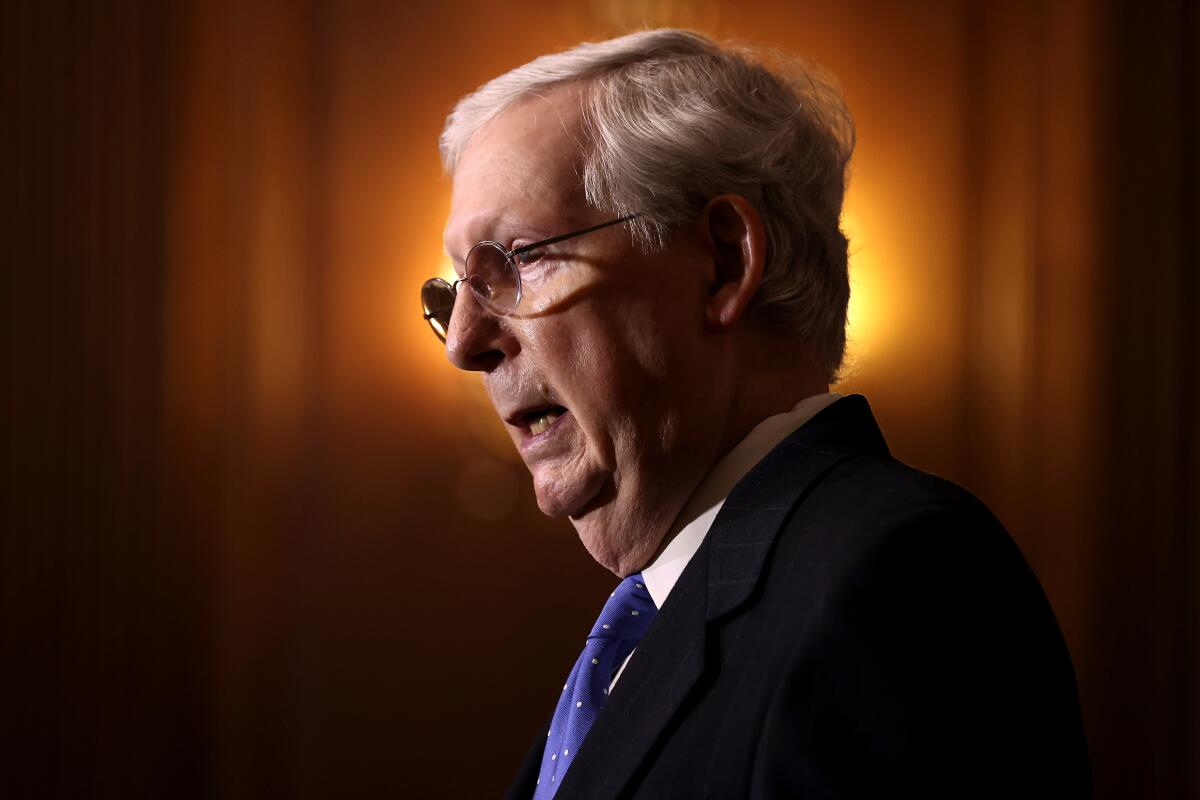Op-Ed: Some political villains develop ethical compasses. Will Senate Republicans?

What the Rev. Joseph E. Lowery, who died last year, told George Wallace about hate speech during the Selma marches in March 1965 seems worth recalling as Congress ponders what to do about a riot-inspiring president.
Lowery, a co-founder of the Southern Christian Leadership Conference, had been designated by Martin Luther King Jr. to represent the SCLC in meeting with Wallace, the Alabama governor, after the Rev. James Reeb was clubbed to death in Selma while he was there for the protests and marches.
âI donât advocate violence,â a defensive Wallace said to Lowery in a 90-minute meeting in his Capitol office in April 1965. In response, Lowery told him, âYou donât in so many words, but you do. You get on television, you rave against people taking the rights of little people and the government coming in and stirring up trouble, and you get your emotions released on TV. But the fella in the dark street, he doesnât have that forum, so he gets a lead pipe to identify with you, and he cracks somebodyâs skull.â
Lowery, a forceful preacher, delivered a memorable benediction at Barack Obamaâs inauguration in January 2009, looking to a day when âwhite will embrace whatâs right.â As the oldest surviving member of Kingâs inner circle, he was known as the âdean of the civil rights movement.â
Lowery was an erudite man who understood violence. As an 11-year-old in Huntsville, Ala., he was shoved off the sidewalk by a white policeman and ran home in anger to get a gun. His businessman father headed him off and sent him to Chicago to live with relatives. He later returned to Alabama, after earning a doctorate of divinity, to take a pastorate at a Mobile church. He joined Kingâs SCLC after the Montgomery bus boycott in 1955.
When I interviewed him in 1974, his memory of his 90-minute session with Wallace was fresh in his mind. Its emphasis on the moral duty of elected officials seems almost quaint now in light of what the nation has been through during Donald Trumpâs divisive presidency.
âWe really challenged him that day on a moral basis,â Lowery told me. âI wouldnât let him get in the political arena. I said to him, âI am speaking to you as a Methodist preacher to a Methodist layman,â which he is, and I said, âGod had given you great gifts, great gifts of leadership, powers of persuasion, and he will call you to account for how you use them.ââ
Those words seemed ominously prescient when Wallace was shot and paralyzed and later seemed to think there was a divine punishment involved in the ceaseless pain that became a âthorn in my fleshâ for the rest of his life. He asked Black leaders to forgive his racial sins. It seems impossible to imagine Trump admitting error, and that points out a fundamental difference between Trump and other political villains such as Wallace, Huey Long and Richard Nixon.
Whatever their faults, each believed in the democratic systems their conduct betrayed. Each saw himself as defending some larger principle: statesâ rights, economic justice, the defeat of communism. Each had a tragic dimension that undermined his better self. But tragedy, by definition, requires some largeness of character. Lowery believed that could even be said of Wallace. âWe moralized his conscience that day, I think,â Lowery said of their moral and ethical debate. âIt was very interesting, a very interesting confrontation.â
One doesnât sense that the Rev. Franklin Graham or any of the evangelicals clutching Trumpâs coattails could â or even want to â bring him to such a reckoning. Say what you will, the man is as true an isolato as Melvilleâs Ahab. Dealing with his failures will never be a problem for him. Dealing with the wreckage symbolized by the thuggery he unleashed on the Capitol will be ours for at least a generation.
More immediately, Congress must deal with the first ring of Trumpismâs hell. Polls show that half of the country believes QAnon conspiracy tales of Satanic child sex rings and the deep state are true or may be true. Around half of Republicans believe Trump rightly won the election. How can a democracy function when its voters canât agree on a common definition of reality?
President Biden will not need a Joe Lowery to moralize his conscience. He is anchored by his faith and his Rooseveltian temperament, and heâll need both with Trump groping for a new âPatriot Party,â a cable show or some other engine of disruption. But itâs Mitch McConnell and the Senate Republicans who need to heed the words spoken to Wallace. Their ability to find an ethical compass looms as a pressing national need.
Howell Raines is a former executive editor of the New York Times and the author of several books, including âMy Soul Is Rested: Movement Days in the Deep South Remembered.â
More to Read
A cure for the common opinion
Get thought-provoking perspectives with our weekly newsletter.
You may occasionally receive promotional content from the Los Angeles Times.










